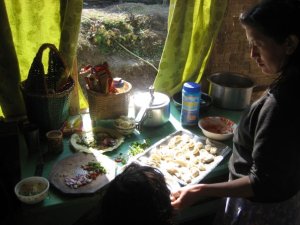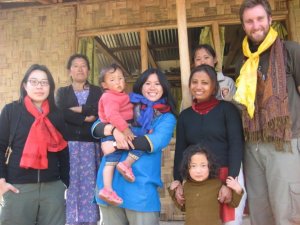A pond, with a paintbrush and a dead fish suspended from a rudimentary fishing pole, greets us as we cross the bamboo bridge, retreating from the sensory force that is India. The Darra Gaon Retreat, nestled in the small village of Darap, is only 7km from Pelling, Sikkim, yet a world away from the comforts and callousness of modernity. A year and a half complete, we are the first guests of the new year and possibly first guests period. We are offered accommodation in either a traditional Limboo house of Lepcha house (or a tent). Wood or stone? We immediately set off around the hills to visit two Limboo families, who kindly treated us to maize (un-popped popcorn) and boiled milk. The encompassing gloom that accompanies the interior of these houses blurs what we would percieve as ‘scarcity’ or even ‘poverty’. However, what we value and what they value in terms of materialism differ immensely, and their ownership of two houses, chickens, buffalo, and fields that produce enough to sustain them, contradict our initial impression of their livelihood. Our arrogant we can be.
The half-constructed state of the retreat only adds to its appeal and charm, knowing that you are some of its very first guests. New car smell. The windowless communal room, with kitchen attached, is where our meals are generously served (dahl bhat). The library contains literary classics such as ‘Some basic rights of Soviet citizens’, and empty Barcardi Breezer bottles are recycled as candle holders. Trickling into the pond is a stream cum garden, resembling the moguls of a ski field. The construction-site vibe does not spoil the quiet, flapping whisper of OM MANI PADME HUM on the wind of the prayer flags. I contemplate my own presence there, thinking to myself ‘is it the prayer flag that moves? Or is it the wind?’ The sixth patriarch of Ch’an Buddhism, Hui Neng replied, ‘Neither. It is your mind.’ There is an almost perceptible stillness in the countryside. Amongst the bleating of the goats, the doddle-do of the rooster, the mooing of the cow. The attraction of such places, of the countryside, away from our hurried, time-constrained lives, lies in the fleeting feeling of the now, of the present, that I can almost realise as I sit here. Relaxing. Peaceful. It goes by many names, descriptions. It is a brief re-discovery of our true nature. Gone is the armour of our self-consciousness, our business card, yoga classes, detox diet, gym membership, Friday night drinks, favourite TV show. All the distractions, intrusions, worries that trouble our life. My life. Fear of the future sneaking up from behind and then nostalgic trap of the past in front. Both by-products of our imagination. Such ‘countrysides’ represent a temporary release from fear, from our attachments.
The retreat itself is an experiment in eco-tourism, in which, according to Manoj Chettri (of the Tourism Department of Sikkim. Friend. Singer. Entrepreneur), aims to implement home-style accommodation that is ‘clean in bed, clean in bathroom, clean in hygiene.’ The hygienic difference between Sikkim and India is very noticeable and appreciated. Not only are plastic bags extinct, but each squat toilet is ultra clean and washed after every use. Although street trash is ever-present and everywhere, it is after all India, it is not as widespread in its quantity and awareness has been generated among the state’s people as to the value of of keeping green clean. The senses delight in, including our sense of environmental moralising, such government policy implementation. I am made acutely aware of my otherness in Darap, as every child can and will call out ‘hello tourist!’, in a very charming and non-ironic way. ‘Hello nani!’ I reply with an ever-present smile now. Giggles and little voices repeating my greeting follow in my wake. The fields are fallow, with the exception of a single man and his two bovine companions ploughing, preparing for spring. Every public building in Darap, and in Sikkim for that matter, has an official commemorative stone tablet, recording the name of the construction, its cost, the start and finish date (or rather, a back date for its construction). An empty building designated as a pharmacy stands empty. Its cost = 200,000 Rs. I can only but laugh.
